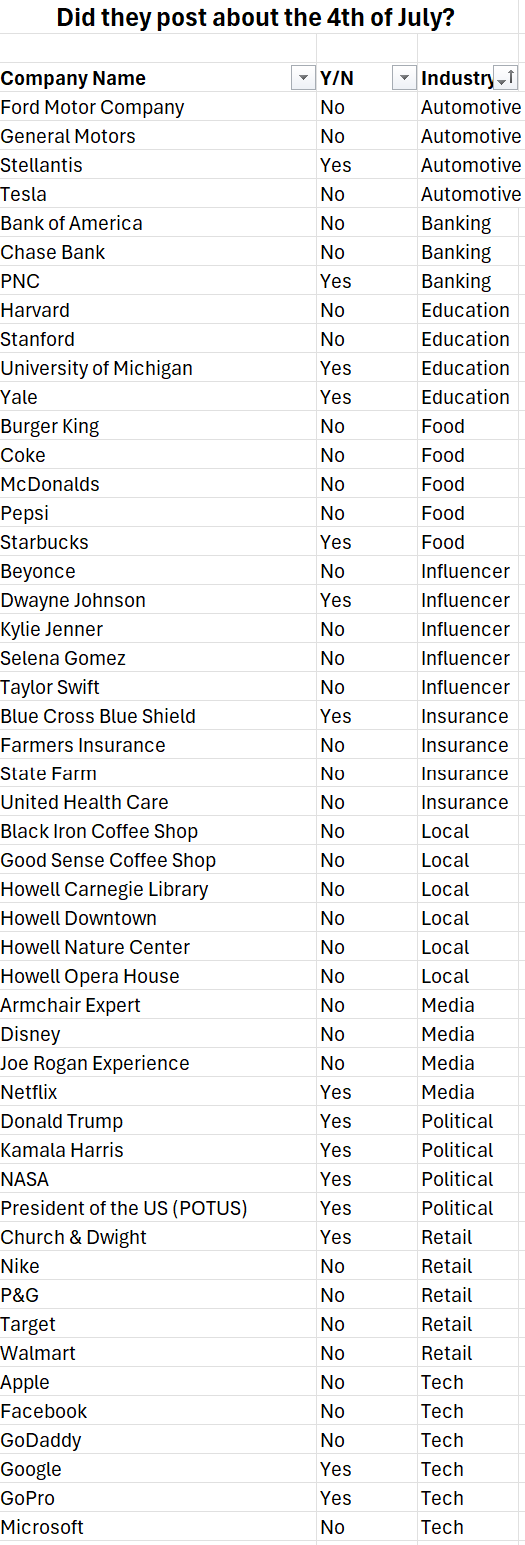Should Small Businesses Acknowledge Holidays on Social Media?
- Liz Achanta

- Aug 19, 2024
- 4 min read
Last week, I started putting together my 2025 social media strategy for one of the products I manage (remember: early is on time, on time is LATE! . . . at least, according to my eighth grade reading teacher). The community I manage the product on behalf of is extremely into holidays, and they have many. I was curious as to whether the 'recognition of holidays' was a tactic I should continue, or should replace with something else.
I went to all of the holiday content pieces I published for the community, and I noticed that the engagement rate was about the same compared to the other posts we had on our feed, so ultimately I will continue to acknowledge holidays for the community. But since I manage social for other products, I had me thinking: should we continue to post for holidays? Is this something that scrollers actually want, or is it a scapegoat for companies to create easy content?
Get ready for this week's blog post: the unofficial research I conducted in order to determine if small businesses should - or should not - acknowledge holidays for their social media, or if it's backfiring and making them lose customers.
The Sentiment Around Holiday Posts

The first part of my research was a Voice of Customer: asking my LinkedIn contacts whether or not they expect businesses to post on holidays. Specifically, I asked them whether or not they expect a holiday post along the lines of "Happy Labor Day," not "here's our holiday business hours" (which I would argue is just as important as updating your Google profile). As you can see on the image I provided, a clear majority of respondents (64%) expressed a negative reaction to businesses acknowledging holidays on social media. Even more telling, 35% of these respondents found such posts annoying. Only a small fraction, 12%, indicated that this type of content was important to them.
This data suggests that holiday posts might not be the crowd-pleaser they are often assumed to be. Instead of driving engagement, they could be contributing to a saturation of content that leaves followers disengaged or even irritated. Similarly, since the social media algorithms' tend to promote those posts that get more engagement, and decrease visibility on those that don't, if a small business is constantly posting content their followers don't want to see (i.e., they scroll past the post and don't acknowledge), the small business could lose visibility altogether.
The Reality on Instagram

To get a broader perspective, I analyzed the Instagram activity of 50 accounts to see whether or not the account posted on the US' Independence Day holiday (on the actual day, July 4th, about the actual holiday. I'll note that some accounts, like Disney, did post - but after the holiday). These businesses included a mix of macro-influencers and local enterprises. The results were striking: only 15 of the 50 businesses (30%) acknowledged the holiday , and these were mostly organizations you might expect to weigh in on national celebrations, such as political figures and universities. None of the local businesses I examined posted about the holiday. I've included that list below:
This trend reveals an interesting dichotomy. While macro-influencers or more prominent entities might feel obligated to post about significant holidays due to their wider audience reach and public expectations, smaller or local businesses seem to refrain from participating. This could be due to a more intimate understanding of their audience's preferences, or perhaps a strategic decision to avoid blending into the sea of generic holiday posts.
The Pros and Cons of Holiday Acknowledgment
Given these insights, it's essential to weigh the pros and cons of holiday acknowledgments for small businesses.
Pros:
Increased Visibility: Holidays can be trending topics, and posting about them can potentially increase your content's visibility.
Showcase Brand Personality: Holiday posts can be a way to infuse your brand’s personality, whether it’s through humor, heartfelt messages, or aligning with specific values.
Engagement Opportunity: For some audiences, holiday posts can spark engagement through likes, shares, and comments, especially if the content is creative or resonates on a personal level.
Cons:
Potential Annoyance: As indicated by your LinkedIn poll, a significant portion of your audience might find holiday posts annoying. This could lead to decreased engagement, unfollows, or even a negative perception of your brand.
Oversaturation: Holidays often flood social media with content. A small business's post can easily get lost in the noise, rendering the effort futile.
Irrelevance: If the holiday doesn’t directly align with your brand’s values or your audience’s interests, the post can feel forced or out of place.
Should Small Businesses Post About Holidays?
Ultimately, whether a small business should acknowledge holidays on social media depends on their unique audience and brand strategy. Your research indicates that many businesses, especially smaller ones, choose not to participate in holiday acknowledgments, perhaps recognizing that it doesn't necessarily add value to their content mix.
For small businesses, the decision to post about holidays should be strategic. If your audience is likely to appreciate the gesture and it aligns with your brand’s values, then it might be worth the effort. However, if the risk of annoying your followers or getting lost in the holiday content deluge outweighs the potential benefits, it might be wiser to skip the post altogether.
In the end, consistency, authenticity, and relevance should guide your content strategy. Posting for the sake of posting—especially around holidays—can do more harm than good. Instead, focus on creating content that genuinely resonates with your audience and adds value to their experience with your brand.


